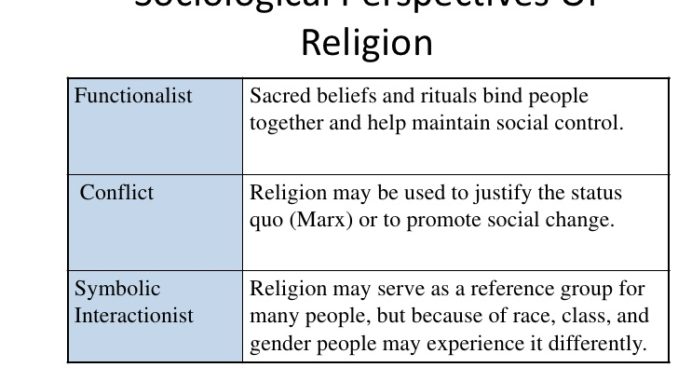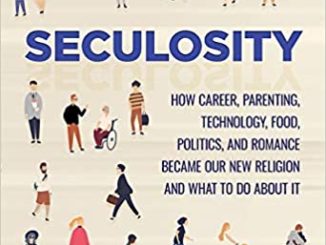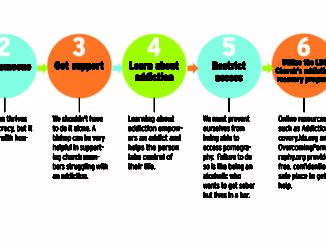
In the study of sociology, we are presented three varying perspectives regarding our interactions with the world and those in it. Although parts of all three contain some bits of truth, it is this author's opinion that the structural-functionalism perspective is more in line with that held within the sphere of religion. When discussing our roles in this life, the bible clearly states that there are "diversities of gifts … differences of administrations … and diversities of operations". (I Corinthians 12: 4-6, King James Version) It is unfortunate, however, that many people tend to focus on what others should be doing, and not on their own responsibility. The problem with Karl Marx's conflict theory is that it focuses solely on one aspect of a problematic situation. In his view, all the rich are evil, and all the poor are good. By his thinking, if you have nothing, it is because those who are wealthy are hoarding it from you, and are by any possible possible shielding the wealth, and the means to it, from you. Your only recourse is to rebel and steal what is "rightfully yours": the Robin Hood complex, so to speak. While this author would never argue that all the wealthy have accrued their riches through just means, he too would never suggest that all the poor are thus, simply because they are being held back by the powerful. Marx fails to take into account that many of the rich have gotten that way through hard work and smart use of their money, and that many of the poor have also entered their state, or remained there, through an irresponsible lifestyle.
In the symbolic-interactionist perspective, we are presented with the idea that the symbols, or labels, we place on people determine how we act toward them. The drawback to this theory is that throughout the world, different peoples and cultures will have contradictory symbols when compared with those from other cultures. Even within a culture, these symbols may change in meaning over time. This fact stems in part from the fact that we are taught that there are no absolutes. Thus, we wind up concluding that something is right, only to change our mind about it when in a different place, or even time. Biblically speaking, right is right and wrong is wrong, regardless of where or when you are.
Structural-functionalism is, according to dictionary.com, "a theoretical orientation that views society as a system of interdependent parts whose functions contribute to the stability and survival of the system." ("Functionalism") By system, it is meant any number of organizations that have multiple groups or individuals, who by necessity, must act and interacts in a specific manner in order that the organism may survive. The use of organism here is in reference to the fact that some sociologists, such as Auguste Comte, saw the interactions of people in a society working much the same way as the different parts of a living organism work together. Although sociologist Robert Merton did not view people's roles in society as being synonymous with the interactions of a living being's organs, he did believe that each being has its own important role to play. Those who fail to play their part are no longer contribute to the functions of a society. They are, rather, adding dysfunctions, which damage the equilibrium of a society. In religion, as in society, members must act in accordance with their assigned or chosen roles if it is to survive and perpetuate. In I Corinthians 12, Paul compares the church to the human body, where each individual member of the church has a specific function. "For as the body is one, and hath many members, and all the members of that one body, being many, are one body: so also is Christ. For the body is not one member, but many. If the foot shall say , Because I am not the hand, I am not of the body; is it therefore not of the body? " (I Cor. 1:12, 14, & 15)
Karl Marx believed that "society is in a state of perpetual conflict due to competition for limited resources" ("What is", 2016). He believed that this conflict was the result of the wealthy and powerful (the bourgeoisie) hoarding their wealth and oppressing the poor (the proletariat). Marx separated his view of society into three parts: the thesis, the antithesis, and the synthesis. In his model, the thesis was the act of the rich controlling the means of production and wealth, the antithesis was the laborers rebelling against the overlords, and the synthesis was the final society formed. However, this would not be the end, for once the synthesis had formed, it would in turn create another thesis which would eventually lead to another antithesis, and so on. Marx felt that if all conflicts eventually resolved themselves, then the perfect society would have been formed, as everyone would now be equal. Religion touches upon this conflict when the bible discusses the proper relationships between those of different stations. Although the bible does indicate we are all equal in the aspect of our righteousness when it says "… there is none that doeth good, no, not one." (Psalm 14: 3), it does indicate that in our situation in life we may not necessarily be peers with those around us. "But in a great house there are not only vessels of gold and of silver, but also of wood and of earth; and some to honor, and some to dishonor." (II Timothy 2:20) What Marx called the antithesis; the bible refers to as rebellion. We should learn to appreciate where we are and what we have. "… for I have learned, in whatsoever state I am, therewith to be content." (Philippians 4:11) That isn't to say that God requires us to be perpetually in a state of ruin. If we apply ourselves, it is possible to dig ourselves out of our unfavorable estate. "If a man therefore purge himself from these (iniquities), he shall be a vessel unto honor, sanctified, and meet for the master's use, and prepared unto every good work" (II Timothy 2:21). What those in power must also realize, the impetus to create a better society isn't just on the workers; those in charge also have a responsibility. "Masters, give unto your servants that which is just and equal …" (Colossians 4: 1).
The symbolic interactionism perspective states that we view those people and things around us based on what symbols we have attached to them. We view people differently based on whether they are our sister or girlfriend, uncle or father, or any other number of symbols we have assigned to those around us. One caveat of this perspective is that meanings of symbols will change over time. One example is marriage and divorce. The meaning of marriage has changed from two parties uniting in mutual feelings of what they can do for each other to "what can the other do for me?" Divorce is no longer looked down on as a sign of failure, but rather as a symbol of freedom. In the last few years the rate of divorce has skyrocketed, splitting families and even friends. In religion, these same symbols are used; However, because they are designated by God, there is no allowance for change. "I change not." (Malachi 3: 6) In the area of divorce the bible says, "Wherefore they are no more twain, but one flesh. What therefore God hath joined together, let not man put asunder." (Matthew 19: 6)
So when considering these three perspectives from the viewpoint of the bible, which one should we concentrate on? When considering the symbolic-interactionist perspective, we must keep in mind what the bible says about our relationships with others. “… whatsoever ye would that men should do to you, do ye even so to them …” (Matthew 7:12) “… an elder, but treat him as a father; and the younger men as brethren … "(I Timothy 5: 1) In a direct clash with the conflict theory, we are commanded biblically to" obey them that have the rule over you … salute them that have the rule over you … "( Hebrews 13:17 & 24), and "… Fear God. Honor the king. Servants, be subject to your masters with all fear; not only to the good and gentle, but also to the forward." (I Peter 2:17) When considering the structural-functionalism perspective, it is very important to keep in mind that our most important concern should be to fulfill our own responsibilities. After he had assigned roles to his disciples, and one of them had confronted him wanting to know what another disciple was going to do, Jesus said to him, "… what is that to thee? Follow thou me." (John 21:22)
References
Functionalism. (nd). Dictionary.com Unabridged. Retrieved February 23, 2016 from Dictionary.com website. http://dictionary.reference.com/browse/functionalism
What is the Conflict Theory? (2016). Investopedia. Retrieved February 23, 2016 from http://www.investopedia.com/terms/c/conflict-theory.asp
Proudly WWW.PONIREVO.COM
Source by Stephen Moore



